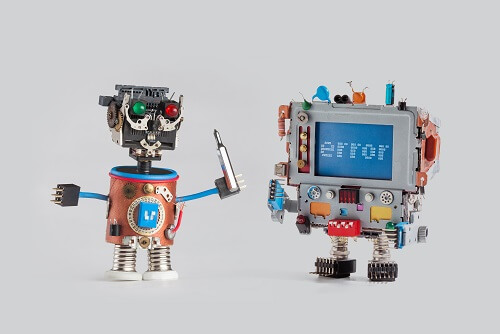The integration of robotics into multiple aspects of life and industry brings forth several legal considerations:
- Innovation and Intellectual Property: Protecting the creative and intellectual assets behind robotic technologies is a cornerstone of this field.
- Liability in Autonomy: As robots gain more autonomy, determining liability in case of malfunctions or accidents becomes complex.
- Privacy and Data Security: With robotics often involving significant data collection and processing, safeguarding privacy and data is paramount.
- Adapting to Regulatory Changes: The regulatory landscape for robotics is ever-changing, demanding agility and proactive legal strategies.
- Ethical and Societal Implications: Robotics Law also encompasses the broader ethical implications of robotic technologies on society and employment.
Our Role in Shaping Robotics Law
At Dilendorf Law Firm, we are not just participants but shapers of this new legal field. Our team combines in-depth legal knowledge with a passion for technology, ensuring comprehensive legal solutions for our clients.
We work with innovators, entrepreneurs, and businesses at the forefront of robotics, helping them navigate this uncharted legal landscape.
As we venture into this exciting intersection of law and robotics, our commitment is to ensure that our clients’ innovations thrive within a robust legal framework, paving the way for a future where technology and legal expertise advance together.
Services Offered by Dilendorf Lawyers

Our lawyers at Dilendorf Law Firm provide a comprehensive range of legal services tailored to the unique needs of the robotics sector.
We understand the intricacies of this rapidly evolving field and offer legal support to ensure our clients’ success and compliance.
Regulatory Compliance
- Navigating the complex regulatory landscapes specific to robotics.
- Providing guidance on compliance with federal, state, and international regulations.
- Staying abreast of regulatory changes and advising clients on proactive compliance strategies.
Intellectual Property Protection
- Developing strategies to protect robotics innovations.
- Assisting with patent procurement for novel robotics technologies and designs.
- Securing copyrights and protecting trade secrets related to robotics software and hardware.
- Advising on IP portfolio management and enforcement.
Contracts and Agreements
- Drafting, reviewing, and negotiating a wide range of contracts relevant to robotics development.
- Handling supplier, distributor, and partnership agreements with a focus on robotics-specific clauses and considerations.
- Advising on licensing agreements, joint ventures, and collaboration contracts in the robotics field.
Litigation and Dispute Resolution
- Representing clients in legal disputes related to robotics technology and applications.
- Handling litigation involving patent infringement, trade secret disputes, and contract disagreements in the robotics sector.
- Providing dispute resolution services, including arbitration and mediation, tailored to the needs of robotics clients.
Business and Corporate Law
- Offering experienced advice on corporate structuring, including the formation of robotics startups and joint ventures.
- Assisting with financing and investment matters specific to robotics companies.
- Guiding transactions, mergers, and acquisitions involving robotics businesses.
At Dilendorf Law Firm, we are committed to providing our clients with the legal experience they need to thrive in the dynamic field of robotics.
Our team of skilled attorneys is equipped to handle the multifaceted legal challenges that arise in this innovative industry, ensuring that our clients can focus on advancing their technologies while we take care of their legal needs.
Industries We Serve
The impact of robotics technology spans a wide range of industries, each facing its own set of challenges and opportunities.
At Dilendorf Law Firm, our Robotics Lawyers have the expertise to serve clients across various sectors, understanding the unique demands and legal landscapes of each.
Here’s an overview of the key industries we serve:
- Healthcare
- Addressing issues related to medical device regulation, patient privacy, and liability in robotic healthcare solutions.
- Manufacturing
- Handling compliance, intellectual property protection, and labor law implications in the robotics-enhanced manufacturing sector.
- Entertainment
- Addressing intellectual property issues, contracts, and liability concerns unique to entertainment robotics.
- Transportation
- Navigating regulatory compliance, safety standards, and liability issues in robotic transportation.
- Financial Technology (Fintech)
- Legal services for robotic applications in fintech, such as automated trading systems and AI-driven financial analysis.
- Advising on regulatory compliance, data security, and intellectual property in the intersection of robotics and finance.
Our expertise in these industries allows us to offer tailored legal solutions that not only address current legal requirements but also anticipate future challenges and opportunities.
Whether it’s ensuring compliance with industry-specific regulations, protecting innovative technologies, or navigating complex transactions, our team is equipped to provide comprehensive legal support in the dynamic field of robotics.
FAQs for Robotics Law at Dilendorf Law Firm
- What is Robotics Law?
Robotics Law refers to the legal field that deals with issues related to the development, deployment, and use of robotics and related technologies. It encompasses areas such as intellectual property, liability, regulatory compliance, and ethical considerations in the context of robotics.
- Why do I need a lawyer specialized in Robotics Law?
Robotics technology often involves complex legal issues that intersect with rapidly evolving technological advancements. A lawyer specialized in Robotics Law can help navigate these complexities, ensuring legal compliance and protection of intellectual property, among other things.
- What types of clients do you represent in the field of robotics?
We represent a diverse range of clients, including startups, established technology companies, investors, and research institutions, across various industries such as healthcare, manufacturing, entertainment, transportation, and fintech.
- How can you help protect my robotics-related innovations?
Our team can assist with intellectual property protection strategies, including patent filings, copyright registration, and safeguarding trade secrets, tailored specifically to the robotics sector.
- Can you assist with regulatory compliance for my robotics company?
Yes, we provide guidance on complying with federal, state, and international regulations relevant to robotics, helping you navigate the complex regulatory landscape.
- Do you handle litigation related to robotics technology?
Yes, we represent clients in disputes and litigation related to robotics technology, including patent infringement, trade secret disputes, and other legal conflicts.
- What should I consider when drafting contracts for robotics projects?
Robotics contracts should address specific issues such as intellectual property rights, liability clauses, regulatory compliance, and confidentiality. Our team can assist in drafting and reviewing these contracts to ensure they meet your needs.
- Are there any unique legal considerations for robotics in healthcare?
Yes, robotics in healthcare involves unique legal considerations including compliance with medical device regulations, patient privacy laws, and specific liability issues.
- How does the emergence of autonomous vehicles impact transportation law?
The rise of autonomous vehicles introduces new legal challenges, including liability for accidents, regulatory compliance, and insurance issues, all of which require specialized legal expertise.
- How often do robotics laws and regulations change?
Robotics laws and regulations are evolving rapidly to keep pace with technological advancements. Our firm stays abreast of these changes to provide the most current legal advice.
Contact Us
For legal assistance in robotics law, contact Dilendorf Law Firm at (212) 457-9797 or via email info@dilendorf.com to set up a consultation.
Our team is ready to discuss your specific needs and how we can assist you.
We keep up to date with the latest developments in AI & Robotics technology and its regulations:
Miso Robotics is accepting reservations for an Offering under Tier II of Regulation A. No money or other consideration is being solicited, and if sent in response, it will not be accepted. No sales of securities will be made or commitment to purchase accepted until qualification of the offering statement by the Securities and Exchange Commission (the “Commission”) and approval of any other required government or regulatory agency.
The two most active applications for mobile robots have been military and law enforcement. For law enforcement, most activities to date have been in the area of explosive ordnance disposal (EOD), where robots are used to keep the human bomb disposal expert out of harm’s way.
Microsoft President Brad Smith joined a law professor and scientist to testify on ways to regulate artificial intelligence. The hearing took place before the Senate Judiciary Subcommittee on Privacy, Technology, and the Law. Regulatory ideas discussed included transparency laws and labeling products, such as images and videos, as being made by AI or not. How AI may affect workers’ jobs was also discussed and debated.
The potential benefits of AI are considerable. As the first-year report by NAIAC noted, “AI is one of the most powerful and transformative technologies of our time” and has the potential to “address society’s most pressing challenges.” But different applications of AI can pose vastly different types of risk, at different levels of severity and on different timescales, depending on the technology and context of deployment.
The framework lays out specific principles for upcoming legislative efforts, including the establishment of an independent oversight body, ensuring legal accountability for harms, defending national security, promoting transparency, and protecting consumers and kids.
“AI has beneficial uses in each of the sectors under the Energy and Commerce Committee’s jurisdiction, from innovation, data, and commerce, to healthcare, to applications in energy.
“This crucial Executive Order on AI is another important example of how the Biden-Harris Administration is leading the way in responsibly using emerging technologies to benefit the American people. Today’s action represents a comprehensive approach–grounded in key principles such as safety and privacy–to ensure that we can leverage AI to help government deliver better for the people we serve, while mitigating its risks.”
The AI revolution is not a strategic surprise. We are experiencing its impact in our daily lives and can anticipate how research progress will translate into real-world applications before we have to confront the full national security ramifications.
Participants acknowledged that if AI is deployed effectively and harnessed responsibly, it promises to drive inclusive and sustainable growth–reducing poverty and inequality, advancing environmental sustainability, improving lives, and empowering individuals in all societies across all stages of development.











































